

What is a troll? This page addresses a parallel concept to vandalism, that of trolling. w:Wikipedia:Dealing with vandalism sets up policies for vandalism: for attempts to disrupt the usability of Wikipedia for its readers. Note that some behavior listed here has been taken as disruption of Wikipedia in Arbitration Committee decisions. Trolling is not necessarily the same as vandalism (although vandalism may be used by trolls). A vandal may just enjoy defacing a webpage, insulting random users, or spreading some personal views in an inappropriate way. A troll deliberately exploits tendencies of human nature or of an online community to upset people. The basic mindset of a troll is that they are far more interested in how others react to their edits than in the usual concerns of Wikipedians: accuracy, veracity, comprehensiveness, and overall quality. Wikipedia Founder Jimbo Wales giving a lecture on dealing with trolls.
The basic policy regarding trolling is simple: please refrain. Disambiguation. Disambiguation in Wikipedia is the process of resolving the conflicts that arise when a single term is ambiguous—when it refers to more than one topic covered by Wikipedia. (A "topic covered by Wikipedia" is either the main subject of an article, or a minor subject covered by an article in addition to the article's main subject.) For example, the word "Mercury" can refer to an element, a planet, a Roman god, and many other things.
Vested interest. For Wikipedia guidelines on people editing articles on topics they are personally, financially, or ideologically connected to, see Wikipedia:Conflict of interest.
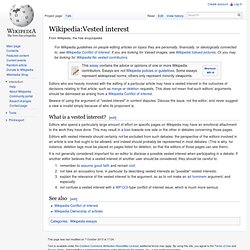
If you are looking for Valued images, see Wikipedia:Valued pictures. Unclean hands. A defendant's unclean hands can also be claimed and proven by the plaintiff to claim other equitable remedies and to prevent that defendant from asserting equitable affirmative defenses.
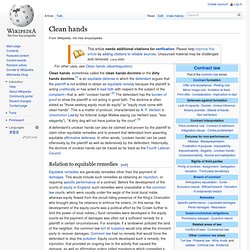
In other words, 'unclean hands' can be used offensively by the plaintiff as well as defensively by the defendant. Historically, the doctrine of unclean hands can be traced as far back as the Fourth Lateran Council. Relation to equitable remedies[edit] Equity courts realized that such extraordinary remedies were only justified in extraordinary cases, and would generally not grant such a remedy where damages were sufficient to make the plaintiff whole. For example, if a car dealership broke a contract of sale and refused to deliver a particular car, which now could only be obtained for $10,000 more than what the plaintiff was willing to pay, the courts would merely award the plaintiff $10,000 (in addition to the original amount paid, if it had already been paid).
NPOV dispute. Articles that have been linked to this page are the subject of an NPOV dispute (NPOV stands for neutral point of view; see below).
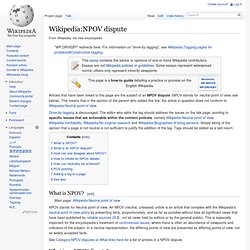
This means that in the opinion of the person who added this link, the article in question does not conform to Wikipedia:Neutral point of view. Drive-by tagging is discouraged. The editor who adds the tag should address the issues on the talk page, pointing to specific issues that are actionable within the content policies, namely Wikipedia:Neutral point of view, Wikipedia:Verifiability, Wikipedia:No original research and Wikipedia:Biographies of living persons.
Ignore all rules. Requests for arbitration/Pseudoscience. Case Opened on 11:13, 12 October 2006 (UTC) Case Closed on 02:38, 3 December 2006 (UTC) Case Amended by motion on 18:58, 2 July 2010 (UTC) Case Amended by motion on 14:32, 27 October 2011 (UTC)
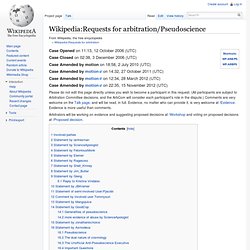
User:Ed Poor/POV pushing. POV pushing refers to the act (or attempt or intent) to evade, circumvent, and undermine Wikipedia's neutrality policy (Wikipedia:NPOV) by creating and editing articles so that they disproportionately show one point of view.
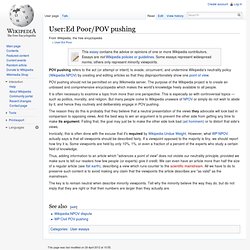
POV pushing should not be permitted on any Wikimedia server. The purpose of the Wikipedia project is to create an unbiased and comprehensive encyclopedia which makes the world's knowledge freely available to all people. It is often necessary to examine a topic from more than one perspective. This is especially so with controversial topics — such as politics, morality, and religion. Writing for the opponent. "WP:WFE" redirects here.
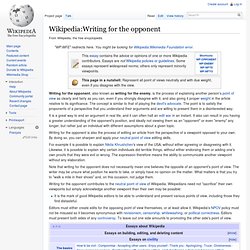
You might be looking for Wikipedia:Wikimedia Foundation error. Writing for the opponent, also known as writing for the enemy, is the process of explaining another person's point of view as clearly and fairly as you can, even if you strongly disagree with it, and also giving it proper weight in the article relative to its significance. The concept is similar to that of playing the devil's advocate.
The point is to satisfy the proponents of a perspective that you understand their arguments and are willing to present them in a disinterested way. It is a great way to end an argument in real life, and it can often halt an edit war in an instant. Talk:Civil POV pushing. What's all this talk about PCCTL?
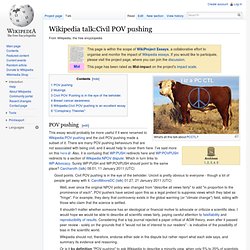
Neutral point of view/FAQ. These are some Frequently Asked Questions about Wikipedia's Neutral point of view policy.
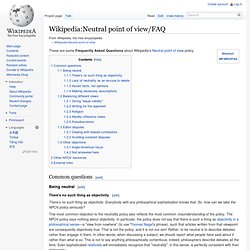
Common questions[edit] Being neutral[edit] There's no such thing as objectivity[edit] There's no such thing as objectivity. Everybody with any philosophical sophistication knows that. Now, is it possible to characterize disputes fairly? Arbitration/Index/Declined requests. This is an archive of cases that have been rejected for consideration by the Arbitration Committee or withdrawn by the initiating user (most recent on top).
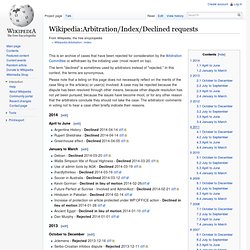
The term "declined" is sometimes used by arbitrators instead of "rejected. " In this context, the terms are synonymous. Please note that a listing on this page does not necessarily reflect on the merits of the case filing or the article(s) or user(s) involved. A case may be rejected because the dispute has been resolved through other means, because other dispute resolution has not yet been pursued, because the issues have become moot, or for any other reason that the arbitrators conclude they should not take the case. The arbitrators' comments in voting not to hear a case often briefly indicate their reasons. 2014[edit] April to June[edit] Argentine History - Declined 2014-04-14 diffRupert Sheldrake - Declined 2014-04-14 diffGreenhouse effect - Declined 2014-04-05 diff. Arbitration/Requests/Case.